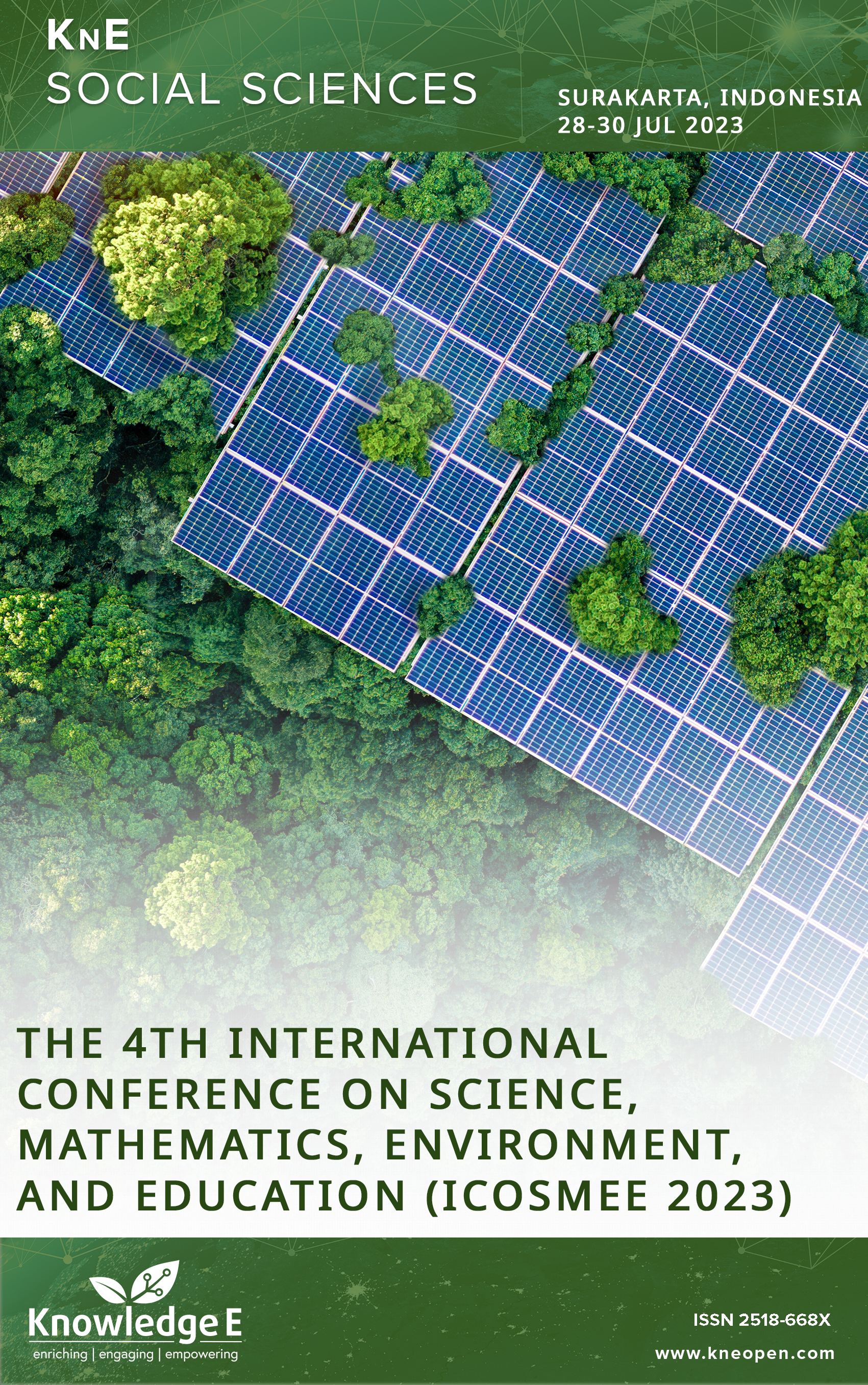Developing a Learning Trajectory on the Conceptual Understanding Procedures of Pythagorean Theorem Material for Junior High School Students
DOI:
https://doi.org/10.18502/kss.v10i11.18742Keywords:
learning trajectory, CUPs, learning obstacleAbstract
This research activity is motivated by students’ learning obstacles that hinder their understanding of the Pythagorean theorem material. Appropriate learning design can be a solution to overcome student learning obstacles. To create high-quality learning, teachers must use careful planning, one of which is considering students’ learning trajectories. Selecting the Conceptual Understanding Procedures(CUPs)learningmodel can help students become active learners and make learning more student-centered. Thus, it is necessary to develop a trajectory which aims to establish its feasibility based on the assessment of material experts and media experts, its practicality based on students’ responses, and its effectiveness based on classical learning completeness. This study used the Gravemeijer & Cobb design research model which consists of three phases: preliminary design, experiment, and retrospective analysis. The results of this study are: (1) Validation in the material expert assessment aspect is worth 3.81 with a very valid category in terms of content feasibility, presentation feasibility, and language. (2) Validation in the media expert assessment aspect is worth 3.47 with a very valid category in terms of content, language, and format. (3) Student response was valued at3.32 with very practical criteria in terms of interest and usefulness. (4) Classical learning completeness assessment shows a value of 90.625% and is declared effective. So, the learning trajectory on the CUPs learning model is declared feasible, practical, and effective to use.
References
Tias AA, Wutsqa DU. Analisis kesulitan siswa sma dalam pemecahan masalah matematika kelas XII IPA di Kota Yogyakarta. Jurnal Riset Pendidikan Matematika. 2015;2(1):28–39. DOI: https://doi.org/10.21831/jrpm.v2i1.7148
Komariyah S, Afifah DSN, Resbiantoro G. Analisis pemahaman konsep dalam memecahkan masalah matematika ditinjau dari minat belajar siswa. Sosiohuman iora : Jurnal Ilmiah Ilmu Sosial dan Humaniora. 2018;4(1):1–8. DOI: https://doi.org/10.30738/sosio.v4i1.1477
Wulan ER, Rofiqoh I, Saidah ZN, Puspitasari D. Fun with SPLDV: multimedia Lectora Inspire menguatkan pemahaman konsep matematika siswa [Jurnal Review Pembelajaran Matematika]. JRPM. 2021 Dec;6(2):83–98. DOI: https://doi.org/10.15642/jrpm.2021.6.2.83-98
Faijah N. Nuryadi, Marhaeni NH. Efektivitas penggunaan game edukasi Quizwhizzer untuk meningkatkan pemahaman konsep teorema phytagoras. Jurnal Pendidikan Matematika. 2022;6(1):117–23. DOI: https://doi.org/10.33087/phi.v6i1.194
Fauziyah N. Learning trajectory in problem-based mathematics learning with literacy andnumeracyreinforcement:animplementationoflessonstudyatjuniorhighschool [ Jurnal Teori dan Aplikasi Matematika]. JTAM. 2023 Apr;7(2):384–97. DOI: https://doi.org/10.31764/jtam.v7i2.12883
Surya A. Learning trajectory pada pembelajaran matematika sekolah dasar (SD). Jurnal Pendidikan Ilmiah [Internet]. 2018 [cited 2024 Jan 8];4(2):22–6. Available from: https://jurnal.fkip.uns.ac.id/index.php/jpi/article/view/11692
Mutaqin EJ. Analisis learning trajectory matematis dalam konsep perkalian bilangan cacah di kelas rendah sekolah dasar. Dwijacendekia Jurnal Riset Pedagogik [Inter net]. 2017 [cited 2024 Jan 10];1(1):19–33. Available from: https://jurnal.uns.ac.id/jdc DOI: https://doi.org/10.20961/jdc.v1i1.13054
Hendrik AI, Ekowati CK, Samo DD. Kajian hypothetical learning trajectories dalam pembelajaran matematika di tingkat SMP. Jurnal Matematika dan Pen didikan Matematika [Internet]. 2020 [cited 2024 Jan 7];1(1):1–11. Available from: https://ejurnal.undana.ac.id/fraktal DOI: https://doi.org/10.35508/fractal.v1i1.2683
Kriswinarso TB, Sugianto L, Bachri S. Pemahaman konsep siswa: eksperimen pada siswa SMP dengan pembelajaran matematika berbasis kooperatif tipe Conceptual Understanding Procedures (CUPs). Venn: Journal of Sustainable Innovation on Education, Mathematics and Natural Sciences [Internet]. 2022;2(1):10–8. Available from: https://creativecommons.org/licenses/by/4.0/ DOI: https://doi.org/10.53696/2964-867X.76
Safitri, Ikshsan M, Susanti. Penerapan model Conceptual Understanding Procedures untuk meningkatkan kemampuan pemahaman konsep matematis siswa MTs. Al Khawarizmi : Jurnal Pendidikan dan Pembelajaran Matematika. 2020;4(1):50–66. DOI: https://doi.org/10.22373/jppm.v4i1.7366
Rahmadina SW, Syahril, Zulirfan. Penerapan model pembelajaran conceptual understanding procedures dalam meningkatkan pemahaman konsep pada topik klasifikasi materi dan perubahannya siswa kelas VII SMPN 6 Siak Hulu. Edusaintek : Jurnal Pendidikan, Sains dan Teknologi. 2023;10(1):58–68. DOI: https://doi.org/10.47668/edusaintek.v10i1.647
Wandanu RH, Mujib A. Firmansyah. Hypothetical learning trajectory berbasis pendidikan matematika realistik untuk mengembangkan kemampuan pemecahan masalah matematis siswa. Jurnal MathEducation Nusantara [Internet]. 2018;3(2):8 16. Available from: https://jurnal.pascaumnaw.ac.id/index.php/JMN
Prahmana RC. Design Research. 1st ed. Depok: Rajawali Pers; 2017. 1–134 p.
Aklimawati LY, Isfayani E. Zainuddin, Aulia R. Pengembangan Hypothetical Learning Trajectory (HLT) berbasis Realistic Mathematics Education (RME) pada materi geometri. Jurnal Serunai Matematika. 2022;14(2):51–63. DOI: https://doi.org/10.37755/jsm.v14i2.665
Rijali A. Analisis data kualitatif. Jurnal Alhadharah. 2018;17(33):81–95. DOI: https://doi.org/10.18592/alhadharah.v17i33.2374
Amrina Z, Desfitri R, Zuzano F, Wahyuni Y, Hidayati H. Development of Problem based Mathematic Learning Model to Increase Students’ Competence. KnE Social Sciences. 2019 Mar;3(15):222. DOI: https://doi.org/10.18502/kss.v3i15.4369
Published
How to Cite
Issue
Section
License
Copyright (c) 2025 Getut Pramesti, Bela Talita Yuli Nastiti, Ario Wiraya

This work is licensed under a Creative Commons Attribution 4.0 International License.

